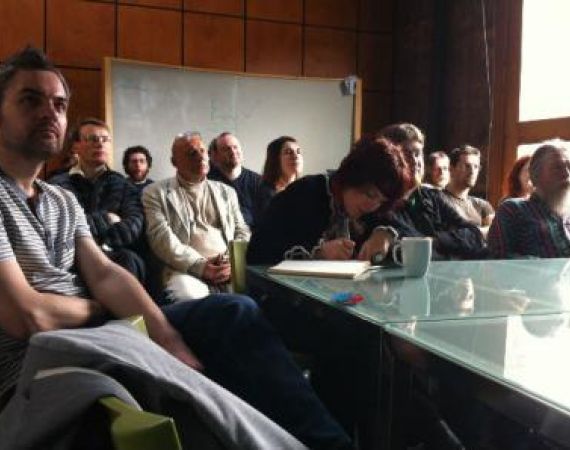Posted on Mon 30 Apr 2012
News from the Pervasive Media Studio: Academic Review Spring 2012
Watershed, University of the West of England and University of Bristol have signed a 5 year partnership agreement to undertake collaborative creative technologies activities through the Pervasive Media Studio including research, innovation, incubation, production and teaching.

Posted by
Watershed, University of the West of England and University of Bristol have signed a 5 year partnership agreement to undertake collaborative creative technologies activities through the Pervasive Media Studio including research, innovation, incubation, production and teaching.
In recent months we have developed and delivered a raft of exciting activity together. The following should help to give a flavour of the ways in which this partnership is starting to evolve:
Demystifying Robotics
Six teams from University of Bristol Computer Science MSc students and third year Product Design BSc students from UWE to combine their skills and develop new ways to teach a new generation about computer science and robotics. At a showcase in January they demonstrated their early prototypes to an academic, public and industry audience including BBC, IBM, HP, Microsoft and IPL.
Pervasive Media Cookbook
The Cookbook is the culmination of a two year AHRC funded Knowledge Transfer Fellowship led by Jon Dovey and researched by Constance Fleuriot as a partnership between the with the Watershed Arts Trust. The project worked with Creative Economy partners to define the language of Pervasive Media production and collect innovative ‘recipes’, a mix of cutting-edge practice and ideas emerging from the research kitchens of the Pervasive Media Studio. Over two years the team ran user tests, workshops, conferences and seminars reaching over 400 people and working closely with SW digital businesses. http://pervasivemediacookbook.com
Cultural Value Networks Research
Watershed & the University of the West of England’s Digital Cultures Research Centre have been working on an AHRC Connected Communities scoping project researching Cultural Value Networks. The research looks at what it means to be a cultural organisation in a creative economy of contribution. Over several months the team have conducted an ethnography of the Pervasive Media Studio to gather evidence about where and how that network understands value, responding to the general notion that cost benefit analysis is the wrong way to understand the production of value for creative economies. The findings will shortly be shared with a wider network of cultural organisations across the UK to consider best practice and explore what kind of KPIs we might all use in the future to better articulate the value of cultural contribution.
Close the door
Recent research has shown that shops can save up to 50% of their energy usage and carbon emissions simply by keeping their doors shut. Close the Door (http://www.closethedoor.org.uk/) is a national campaign that seeks to highlight this and change the habits of both shops and customers. In partnership with the Dept. of Computer Science at the University of Bristol, a series of mobile apps have been developed to investigate if technologies that incorporate crowd sourcing and gaming techniques (e.g. points, badges, and real world rewards) can encourage behaviour which has a positive environmental impact, e.g. encourage shops to close their doors!
The Curzon Project
Charlotte Crofts from the Digital Cultures Research Centre is working with the Curzon Community Cinema, Clevedon to explore how location-based media can be used to enhance their new exhibition of the Curzon Collection and the cinema’s history (which has been funded by the Heritage Lottery Fund). Charlotte has been working closely with the Curzon to pilot a number of digital technologies (a variety of “context aware” platforms such as GPS, QR codes, mobile phone applications, mobile internet, arduino circuits) that aim to enhance the exhibition, enabling visitors to gain further insight into the history of the building and the equipment.
i-Docs
Spanning the 22nd and 23rd March, the i-Docs 2012 conference, held at Watershed, was the second iteration of perhaps the only international conference dedicated to the emerging category of interactive documentary making. Over two days of conference presentations a diverse range of speakers and an enthusiastic audience explore themes such as 'questioning participation', 'layered realities' and cutting edge online production tools, such as 3WDOC Studio, Klynt and Popcorn. You can read more about the conference on the i-Docs website, including Storify documentation.
‘Second Screen’ Fusion Labs
The BBC, under the Bristol Anchor agreement, is exploring the development of University partnership protocols to stimulate learning and innovation. The Lab explores emerging creative tools and platforms for the enhancement of broadcast content development, delivery and audience participation. The Digital Cultures Research Centre is currently collaborating in a pilot three month rapid innovation project. This exciting scheme has attracted students and graduates from computer science, animation, graphic design and media, who through a series of innovation labs, are working on a portfolio of live briefs set by factual and natural history programme makers at the BBC.
REACT Heritage Sandbox commissions announced
Six projects have been commissioned out of the South West to unlock histories, hauntings and happenings in all kinds of UK heritage attractions, unraveling rich experiences through the use of cutting edge technologies. The commissions come under the banner of Heritage Sandbox, the first run of funding announced by REACT, led by UWE with Bristol, Bath, Exeter and Cardiff Universities, one of four UK Knowledge Exchange Hubs for the Creative Economy funded by the Arts & Humanities Research Council (AHRC).
Danceroom Spectroscopy
In collaboration with the Studio, University of Bristol’s Centre for Public Engagement, Arnolfini and EPSRC, quantum chemist David Glowacki has developed danceroom Spectroscopy (dS), a virtual world that allows people to step into the highly correlated world of molecular motion and quantitative feedback. Using cutting edge 3d imaging, real-time computing, and rigorous physics, dS transforms your movement into real-time ripples and waves that warp virtual particle forcefields, triggering sound and image so that they emerge as interactive visuals and soundscapes. http://danceroom-spec.com/
Coming up
We are currently working on a number of collaborative projects including a mobile application bootcamp with Helen Kennedy from DCRC that will give non-programmers from both partner universities and the wider community the opportunity to better understand the audience, phemonenology and affordances of app development. We are also planning a two-day haptics workshop with Sriram Subramanian from the Bristol University Computer Science Department to explore potential real world applications for this emerging technology.
